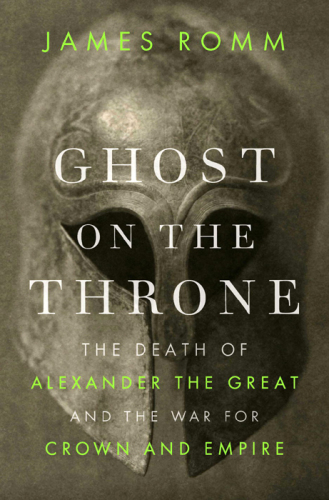
Ghost on the Throne
The Death of Alexander the Great and the Bloody Fight for His Empire
کتاب های مرتبط
- اطلاعات
- نقد و بررسی
- دیدگاه کاربران
نقد و بررسی

August 1, 2011
In this fast-paced and absorbing account, Bard College classics professor Romm chronicles the political intrigues and military conflicts of the half-dozen generals who struggled for power after Alexander the Great's death in 323 B.C.E. The goal for each was control over an empire stretching from the Danube to the Indus. Because Alexander left no will or obvious successor, his seven closest friendsâthe Bodyguardsâfought not only to preserve Alexander's Macedonian empire but also among themselves to mark out territory to rule. Drawing deeply on sources such as Plutarch's Lives and the anonymous The Lives of the Ten Orators, Romm brings to life the Bodyguards and their struggles to maintain their territories. As Romm points out, five of the Bodyguards placed crowns on their own heads, creating five royal dynasties to replace the one they had lost. A decade after Alexander's death a new multipolar political order had emerged, one marked by rivalry, shifting alliances, and long-running, small-scale conflicts. Romm's captivating study stands alongside Robin Waterfield's engaging recent Dividing the Spoils as a sterling account of a little discussed era in ancient history.

August 1, 2011
Scholarly but colorful account of the toxic fallout from the untimely demise of a continent-striding conqueror.
Alexander the Great dreamed of "a single world-state stretching from the Atlantic to the Indian Ocean," but died of a mysterious fever (possibly poisoned) on the eve of his campaign against the Arabs in 323 BCE. His inner circle of trusted military men were soon dividing the empire among them; Perdiccas, the senior officer to whom Alexander had passed his signet ring, hoped that he could maintain an equilibrium by giving grizzled veterans Craterus and Antipater control of Europe, while he oversaw Asia from Babylon, sidelining his main rival Ptolemy in Egypt (to which Ptolemy deftly hijacked Alexander's legacy-imprinting corpse). Alas, writes Romm (Classics/Bard Coll.; Herodotus, 1998, etc.), "Alexander had...nurtured in his staff an endless appetite for command and conquest." Allegiances changed rapidly, and the leaders' fortunes depended largely on the erratic loyalty of Alexander's soldiers, in particular the famed Silver Shields, who were capable of fighting a battle on one side, then abandoning their general to join the victor. To this volatile mix were added several strong-minded women: Alexander's mother Olympias, scheming to marrying his sister Cleopatra to a general who could protect them, and his niece Adea, wife of his mentally deficient half brother Philip. As soon as word of Alexander's death got out, Greek city-states led by Athens revolted, war-weary troops in Bactria (northern Afghanistan) mutinied and chaos threatened everywhere. The names can be as hard to keep straight as the marital and military maneuvers, but Romm paints a vivid portrait of ancient politics, which were highly personal and extremely deadly. The murders of Olympias, Cleopatra, Philip and Adea, as well as Alexander's Bactrian widow and their son, put an end to Macedonia's Argead dynasty and signaled the arrival of "a multipolar world marked by rivalry, shifting alliances, and long-running small-scale conflicts—in many ways, a world like our own."
Best appreciated by readers with some grounding in ancient history, but lively enough to engage newbies as well.
(COPYRIGHT (2011) KIRKUS REVIEWS/NIELSEN BUSINESS MEDIA, INC. ALL RIGHTS RESERVED.)

September 1, 2011
When Alexander the Great died at a relatively young age and faraway from Macedonia, determining his successor threw much of southern Europe, central Asia, and northern Africa into disarray. Romm (classics, Bard Coll.; The Edges of the Earth in Ancient Thought) details the first decade of the wars and intrigues among Alexander's generals and family as they fought to maintain their right to rule the empire. The "ghost" of Alexander was still in control; his physical body was held ransom for political gain, and his spirit was evoked, although his successors lacked his charisma and skill. Given the number of characters and the vast distances involved, this is a complex story to tell; Romm's rhetorical flourishes and chapter labeling help. VERDICT Similar to Robin Waterfield's recent Dividing the Spoils: The War for Alexander the Great's Empire, this book focuses in much more detail on the first decade after Alexander's death. This should be fascinating to fans and students of Alexander the Great and his legacy.--Margaret Heller, Dominican University Lib., River Forest, IL
Copyright 2011 Library Journal, LLC Used with permission.

September 15, 2011
As a conqueror, Alexander of Macedonia was the Great, but could he have ruled and governed wisely? We will never know, since he died young in 323 BCE. Almost immediately, the struggle to control his vast empire began, sparking a century of internecine warfare among his successors and the eventual creation of three large, dynastic states ruled by three of Alexander's generals and their progeny. The three states forged a new ruling culture across three continents, one in which a Greek upper crust dominated a multitude of ethnic groups, a form of society termed Hellenistic. Bard College classicist Romm tells the story of this world in an exciting narrative filled with daring, ruthless actors playing for giant stakes. They include some remarkable, admirable men, such as Ptolomy, whose cleverness and gift for survival led to a stable dynasty in Egypt, and fascinating but doomed women, including Olympias, Alexander's mother, and Roxanne, his widow. This is an absorbing account of an often confusing period and thus is suitable for well-informed general readers.(Reprinted with permission of Booklist, copyright 2011, American Library Association.)

























دیدگاه کاربران